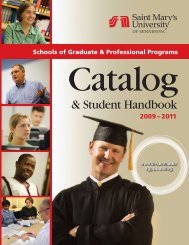PDF version - Saint Mary's University of Minnesota
PDF version - Saint Mary's University of Minnesota
PDF version - Saint Mary's University of Minnesota
Create successful ePaper yourself
Turn your PDF publications into a flip-book with our unique Google optimized e-Paper software.
Academic Policies & Procedures<br />
Students who are absent for two or more consecutive classes because <strong>of</strong> an acute illness or personal<br />
emergency should notify the director <strong>of</strong> academic advising, who will, in turn, notify instructors <strong>of</strong> the illness<br />
or personal emergency. Such absences are not covered by the recommendations above and instructors<br />
are encouraged to find ways to allow students to complete missed work.<br />
Instructors are required to include their attendance policy, in as much detail as possible, in their syllabi<br />
to reduce the possibility <strong>of</strong> confusion or misinterpretation. In addition, instructors must announce their<br />
policy within the first week <strong>of</strong> class and require that student-athletes or music students who are scheduled<br />
to miss several classes speak with them after class. A student who anticipates several absences may<br />
be able to be moved to a different section or take the class another semester.<br />
Course Substitutions and Waivers<br />
Students may appeal to the department chair for a course substitution or a course waiver for a required<br />
course in a major or minor. The department chair (if the substitution or waiver is being allowed) should<br />
obtain the Substitution/Waiver form from the registrar’s <strong>of</strong>fice, fill it out, and return it to the registrar’s<br />
<strong>of</strong>fice. Students may not pick up and should not submit these forms.<br />
Independent Study Projects<br />
Independent study projects <strong>of</strong>fered at the university are available for credit only to <strong>Saint</strong> Mary’s <strong>University</strong><br />
students. Post Secondary Enrollment Option (PSEO) students are not eligible for independent study<br />
courses. Independent study projects may be individually designed projects or they may be catalog<br />
courses pursued as independent study projects. However, no catalog course may be pursued as an independent<br />
study project in the same semester in which that course is <strong>of</strong>fered in the regular schedule <strong>of</strong><br />
classes. Independent study projects may, with approval, be used to fulfill general education requirements,<br />
major requirements, or elective credit requirements. Students may take up to eight independent<br />
study projects (for a total <strong>of</strong> no more than 24 credits) during their undergraduate career. Students are limited<br />
to two such projects (for a total <strong>of</strong> no more than six credits) in any given semester. Students should<br />
avoid taking several independent study projects from the same instructor. Independent study courses<br />
are not available to students whose cumulative GPA is less than 2.000. Procedures and necessary forms<br />
for approval <strong>of</strong> independent study projects may be obtained in the registrar’s <strong>of</strong>fice. The independent<br />
study form must be submitted for approval to the vice president for academic affairs before the end <strong>of</strong><br />
the add/drop period.<br />
Final Examinations<br />
At the end <strong>of</strong> each semester, there is a period devoted to final examinations. Instructors must hold an<br />
exam or educational experience during the examination period. No student may be required to take<br />
more than two examinations on any one day in the final examination period. If none <strong>of</strong> the instructors<br />
scheduling an examination in such an instance is willing to adjust the examination time for the student,<br />
the instructor giving the middle examination(s) on that day must examine the student on another day.<br />
Instructors are not required to give the examination prior to the scheduled date in such instances.<br />
Copyright Law<br />
Copyright is a form is protection provided by the laws <strong>of</strong> the United States (title 17, U.S. Code) to the<br />
creators <strong>of</strong> "original works <strong>of</strong> authorship," including literary, dramatic, musical, artistic, and certain other<br />
works. Protection is available to both published and unpublished works, but the work must be fixed in a<br />
tangible medium <strong>of</strong> expression. The owner <strong>of</strong> the copyright is given the exclusive right to make copies,<br />
to create derivative works based upon the original work, to distribute the work to the public, to perform<br />
or display the work publicly, and, for sound recordings, to perform the work publicly by means <strong>of</strong> digital<br />
or audio transmission.<br />
31<br />
31
















